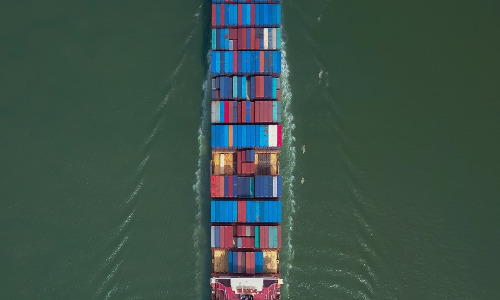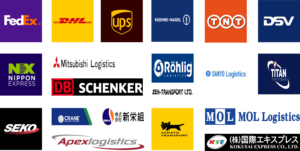Overview
Basically the import consumption tax and customs duties are imposed when import declaration is made, those are calculated by multiplying the import declaration price by the tariff rate. The determination of the import declaration price should be decided by the importer under him/her responsibility.
The import declaration price (customs value) is determined by the following steps.
※Please note that this article is drafted mainly aiming to make understandings as capturing big picture, therefore it does not describe details regarding Japan Customs Tariff Law.
| Sale transaction exists between importer and exporter | YES → | [1] Principle determination method |
| NO ↓ | ||
| Already imported goods which meet the identical or similar conditions of the import goods | YES → | [2] Use of the transaction value of identical or similar goods method |
| NO ↓ | ||
| Able to identify the sales price and costs incurred in Japan | YES → | [3] Use of the domestic selling price method |
| NO ↓ | ↕ selectable [3] or [4] | |
| Exporter is a manufacturer and able to provide production cost | YES → | [4] Use of the production cost method |
| NO ↓ | ||
| [5] Other methods | ||
[1] Principle determination method
In principle, if the import is made based on the import transaction※1, we can use the principle determination method.
※1:Import transaction is a transaction that a buyer in Japan makes a sale transaction with an overseas seller for shipping the goods to Japan, and the goods actually arrive in Japan.
The Customs Value is the transaction price paid by the buyer to the seller, plus the additional expenses.
Customs value = Transaction price = Actually paid or payable※2 + Additional expenses※3
※2: The Customs value of imported goods shall be the transaction value, that is the price actually paid or payable by the buyer to or for the benefit of the seller for the imported goods relating to the import transaction.
※3:For instance, transportation fee, insurance fee, commissions.
The principle determination method cannot be used for certain import cases, for instance, if there is no sales transaction, goods are traded free of charge, etc. In these cases, the following alternative methods are applied for the determination of the Customs Value.
[2] Use of the transaction value of identical or similar goods method
(1)Overview
If you already imported identical or similar goods, the customs value can be determined by using those goods if conditions raised by the following can meet.
Conditions of being identical goods
- The imported goods should have exported approximately within one month before or after the export date of the targeting import goods.
- The imported goods should have produced in the same country as the targeting import goods.
- The imported goods should have an identical shape, quality and value as the targeting import goods.
Conditions of being similar goods
- Same requirement as previously mentioned 1.2. in identical goods.
- The imported goods has similarity in terms of shape, component and functions. And it should be interchangeable with the targeting import goods.
(2)Documents need to prepare
- The materials to prove the identity and similarity. e.g. specification document, photos.
- The customs clearance documents related to the referenced identical / similar goods, such as invoice, import permissions.
[3] Use of the domestic selling price method
(1)Overview
In case customs value cannot be determined by the previous methods, the determination method [3] using of the domestic selling price or [4] using of the production cost can be applied. Upon request by importer, the priority of between [3] and [4] are selectable.
If we look at the [3] use of the domestic selling price method, the calculation is made by follows.
Customs value = Domestic selling price※4 - (general expenses required for the domestic sales of identical / similar goods, domestic transportation costs, and paid taxes & customs duties etc.)
(2)Documents need to prepare
- The evidence to prove the domestic selling price
- The materials to prove the domestic expenses (Invoice receipt from logistic companies, invoice receipt to confirm the paid taxes & customs duties)
[4] Use of the production cost method
(1)Overview
When the manufacturing cost of the imported goods can be identified, the customs value can be determined by follows.
Customs value = Production cost of the import goods + (general profits and expenses of export sales of identical / similar goods and the transportation costs until arrival at the port in Japan)
(2)Documents need to prepare
- The evidence to prove the manufacturing cost, such as accounting ledger of the producer
- The materials to prove the profit and expenses added to the production costs, such as invoices
[5] Other methods
(1)Overview
If the methods mentioned previously cannot be used, Other methods will be applied.
Practically, in many cases, we apply this other methods.
As an example, we’d like to introduce one of the other methods which is applying to Amazon FBA’s case, that overseas seller ship and import their goods to Japan.
Customs value = Selling prices in average※5 - Deductible costs (e.g. FBA fee, Referral fees)※6
※5:Average of the selling prices is basically for the goods soled in past 30days on Amazon’s website.
※6:The deductible costs incurred after the arrival of the imported goods in Japan can be considered as deductible costs.
(2)Documents need to prepare
- The materials to prove the selling prices in average, and deductible costs you use for the calculation.
Please find the explanatory materials regarding customs value for Amazon-FBA’s overseas sellers : Main Trade Procedures and Customs Valuation(English)
Please feel free to contact us if you would like to discuss anything regarding your customs valuation issues.
Please Be Careful
In cases where foreign corporations (non-residents) without an office in Japan import goods, failure to properly prepare an Importer of Record (IOR) through an Attorney for Customs Procedures (ACP) or similar means can result in goods being held at customs, leading to significant delays and costs. To avoid such risks, please make thorough preparations.
If an ACP is needed, it is crucial to utilize the services of an experienced ACP well-versed in customs-related laws and regulations. The import and export operations of non-residents/foreign corporations using an ACP are treated as unique cases. Many customs brokers are not familiar with these procedures, leading to incidents where goods are detained for extended periods due to unsuccessful explanations to customs. (Customs will not permit the import if the explanations provided by the importer or customs broker are unsatisfactory, resulting in the goods being detained until customs is convinced.)
We highly recommend utilizing our services as professional experts in customs, knowledgeable about customs-related laws and regulations. With a proven track record of resolving numerous issues through direct consultations with customs officers and customs brokers, our clients supported as an ACP now exceed 100 companies. We are committed to delivering industry-leading results with our expertise.
Our ACP Service: The Best Solution for the Japan Importer of Record (IOR) and Exporter of Record (EOR)
Attorney for Customs Procedures (ACP) is the best solution for addressing the issue of Japan IOR – Importer of Record. Below is an outline of our primary services and a diagram illustrating the operational structure of the ACP service. Upon successful ACP registration, a foreign entity can become the Japan IOR – Importer of Record.
Basic Scope of Services:
- Consultation with the Japan Customs Office for successful ACP registration.
- Liaising with stakeholders, including Logistics Forwarding Companies and the Customs Offices, on behalf of non-resident clients (i.e., non-resident Japan IOR) to ensure the secure importation of goods.
- Assistance in preparing the necessary documentation for import clearance.
- Support of calculation of Customs Value (Customs Valuation Formula), in accordance with appropriate compliance under the Japan Tariff Customs Law.
- Security Export Control (Classification for List Control, Examination for Catch-All Control, Application of the license to Ministry of Economy, Trade and Industry)
- Documents keeping, required under article 95 – Japan Customs Law
- Providing professional trade/customs advice if any issues arise.
**Both import and export activities can benefit from the use of an ACP (Attorney for Customs Procedures). This support is applicable in scenarios where a non-resident acts as the Importer of Record (IOR) for imports and as the Exporter of Record (EOR) for exports.
Three Steps to Initiate Shipments Under the ACP Program: :
- Quotation Review to Contract Conclusion: Upon receiving your contact details, we will promptly provide a quotation for your review.
- Commencing the Registration of ACP (Attorney for Customs Procedure) to Japan Customs: This process is generally completed in about two weeks.
- Initiation of First Shipment, Import/Export
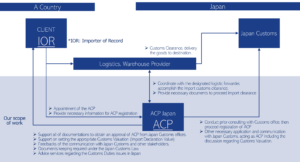
Japanese Customs System Reform: Clarification of Importer Definitions
Starting October 1, 2023, Japanese Customs has instituted a pivotal reform aimed at addressing the issue of foreign sellers improperly designating third parties (such as forwarders or customs agents) as importers.
This revision necessitates foreign corporations to utilize an Attorney for Customs Procedures (ACP) to assume the role of Importer of Record (IOR) directly in many cases. The practice of merely nominally appointing another entity as the importer is no longer feasible.
Notably, foreign corporations that act as importers themselves, through the engagement of ACP, are eligible for Japan Consumption Tax (JCT) benefits. (link: Consumption Tax Treatment and Benefits of Using ACP).
As a dedicated ACP firm, we ensure compliance with the law to facilitate correct import procedures, allowing you to trust us with your importation requirements confidently. We are eager to engage in further discussions with you.
Revisions Effective October 1, 2023:
Definition of the Importer
- Regarding a cargo imported under import transaction, an importer is equivalent to “a person who imports a cargo” defined in Article 6-1 (1), General Notification of the Customs Act. ….. This means, the Consignee, etc., in the case of imports conducted through normal transactions between an overseas seller and a Japanese buyer
- In the cases other than above, an importer is a person who has a right to disposition of the import cargo at the time of import declaration. If there is another person who acts on the purpose of the import*, that person is also included :
In case of a cargo imported:
– under lease contracts, a person who rents and uses the cargo.
– for consignment sales, a person who sells the cargo in the name of himself/herself (consignee) by accepting the commission.
– for processing or repairing, a person who processes or repairs the cargo.
– for disposal, a person who disposes the cargo.
For additional information, please refer to the following resources:
- Japan Customs: Leaflet(English) Revision of Import Declaration Items and Attorney for Customs Procedure (ACP) System
- English: Announcement from Japan Customs | Mandatory to Use ACP in Many Cases – Attorney for Customs Procedure
Our Customers – Japan IOR / Attorney for Customs Procedures (ACP) Service
All our clients have successfully become Japan Importer of Record (IOR) and imported goods into Japan under our guidance.
Logistics Companies with Collaboration Experience
Here is a list of our partner logistics and forwarding companies with whom we have had successful collaborations. Please note that this list is not exhaustive, as we are open to working with any logistics or forwarding companies. As Attorneys for Customs Procedures (ACP), we represent non-resident clients (IOR) and coordinate with these logistics companies, who manage the transportation of goods to and from Japan.
Why choose us?
- Customs and International Trade Professionals – Our CEO, Mr. Sawada, is a Certified Customs Specialist in Japan. With years of experience providing services in the Trade & Customs field, his leadership at KPMG and the establishment of his own company, SK Advisory, ensures our commitment to excellence and high-quality service.
- Full Adherence to Japanese Customs Law – Our top priority is to maintain full compliance with Japanese Customs Law and safely import / export our clients’ goods into / from Japan. We meticulously manage all import compliance aspects, including Japan Importer of Record (IOR) matter, HS code classification and the correct Customs Valuation of goods entering Japan. We support to complete all the necessary shipping documents, such as Invoice, Packing List and BL, on behald of non-resident / foreign Japan IOR.
- Communication in English, Chinese, and Japanese – Our team, with extensive international experience, excels in communication in English, including facilitating English-language meetings, and has earned considerable trust from clients. We also have staff capable of communicating in Chinese, making us equipped to handle Chinese-language support as well. Naturally, as a Japan-based team, we’re totally fluent in Japanese, ensuring seamless communication across these three key languages.
- Reputable and Reliable Partner -The growing demand for our Attorney for Customs Procedures (ACP) services is testament to our quality. We proudly serve clients globally, registering over 50 ACP customers annually. Our consistent track record underscores our reliability and credibility. Our unwavering commitment ensures all our clients successfully acquire Japan IOR status and import goods seamlessly into Japan.
- Handling Regulated Products – Our ACP/IOR partnership system can manage regulated items, including cosmetics, PSE-products, foodstuffs, and tableware.
- Recognized ACP Service Provider on Amazon SPN (Service Provider Network) – We are a certified ACP service provider within Amazon’s Service Provider Network (SPN), listed under the Trade Compliance category. Many international Amazon Sellers have successfully become Japan Importers of Record (IOR) through our ACP services.

FAQ for ACP (Attorney for Customs Procedures)
What is the role of ACP (ACP Japan)?
- Representation: ACP (ACP Japan) represents the foreign importer and liaises with Japan Customs and the Forwarding Company/Customs Broker.
- Documentation and Compliance: ACP assists in preparing essential import documents (e.g., Invoices) in compliance with Japan Customs Law and formally requests the Customs Broker to proceed with customs clearance.
- Expert Consultation and Troubleshooting: We are a team of legal experts in Customs Laws, providing direct consultations with Japan Customs to ensure compliance and address issues, including troubleshooting unique challenges in non-resident imports.
How long time does it require to get ACP’s registration?
It will take approximately 2 weeks until getting an approval from Japan Customs Office.
The breakdown of the task is as follows.
- Prepare the necessary documentation between us
- Start pre-consultation with Japan Customs Office and proceed initial review
- Submit paper-based set of application documents to Japan Customs Office for final review
What kind of documents to be necessary for ACP application?
Not limited, but for instance – Power of Attorney, Company Registry, The calculation method of Customs Valuation, Catalog of the import goods, business/logistic flow
ACP can handle all kinds of goods?
Whereas many ACP service providers do not handle regulated items, our company’s competitive advantage stems from our ability to manage such products. We can support regulated items, including cosmetics, PSE-regulated products, foodstuffs, and tableware.
Which regions in Japan are we covering?
Any region in Japan, we can handle.
What is difference between ACP and IOR?
ACP is not the Importer. ACP enables non-resident entities to become IOR (Importer of Record).
Japan Qualified Invoice System and Compliance JCT (Japan Consumption Tax)
Recently, many companies have been registering as Qualified Invoice Issuers for Japanese Consumption Tax (JCT) due to the new invoice system introduced in October 2023. This new system is similar to the EU’s VAT invoice system.
After October 2023, your Japanese customer can’t claim input JCT tax credits unless the sellers(suppliers) issue a qualified invoice that is written a JCT number. To issue a qualified invoice, sellers(suppliers) need to be a taxable entity and get a JCT number.
Before October 2023:
Any customer (Company-B) who paid for goods or services could deduct input JCT regardless of whether the seller (Company-A) was registered for JCT. There was no requirement to verify the tax status of the seller.
After October 2023:
Any customer (Company-B) can only deduct input JCT if Company-A, the seller, is registered and can provide a qualified invoice with a JCT registration number. If Company-A cannot issue such an invoice, Company-B may choose not to continue purchases from them.
If Company-A sells only to consumers and not businesses, it may not need to issue qualified invoices since consumers typically do not claim JCT tax returns.
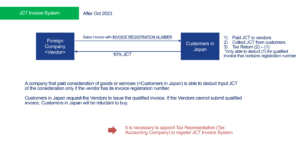
Once Company-A obtains a JCT invoice registration number, it becomes a taxable entity required to file JCT returns regularly.
For non-resident entities (Company-A) importing and selling in Japan, the standard procedure involves three steps:
- Pay import JCT to customs: 10% of the import customs value.
- Collect JCT from customers in Japan: 10% of the sales price.
- File a JCT tax return and pay the net JCT to the tax office.
If Company-A paid the import JCT as the importer using an Attorney for Customs Procedures (ACP), they need only pay the net amount of sales JCT minus import JCT.
If Company-A paid the import JCT but was not the importer, they must pay all the collected sales JCT without deducting the import JCT.
Therefore, using an ACP to act as the Importer of Record (IOR) is crucial for managing JCT deductions and refunds. If another company acts as the IOR, you cannot deduct the import JCT, resulting in significant costs.
We strongly recommend using our ACP services to ensure you can act as IOR, optimizing your JCT handling. Our team has extensive experience helping clients become importers and successfully manage their JCT responsibilities. You can rely on our expertise to navigate these complexities.
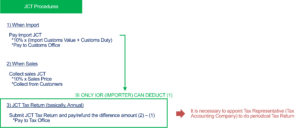
—
We’re a reliable ACP service provider for Amazon FBA’s seller
In recent, we’ve been supporting many import projects of goods related to the Amazon-FBA program. If you are looking for a reliable ACP service provider, please let us know.
—
Guidance by Amazon
According to the seller central website in Amazon, there is guidance by Amazon that a non-resident entity needs to appoint an ACP or IOR. You may check on this link:
Non-resident requirements
A Fulfillment by Amazon (FBA) seller who lives outside of Japan (non-residents) and would like to import goods into an Amazon Japan fulfillment center for storage and order fulfillment must first designate an Import of Record (IOR) and /or Attorney for Customs Procedure (ACP). This must be accomplished in advance of any importations. In general, any person who is a resident of Japan can be appointed as an IOR and/or ACP. Neither Amazon nor any of its entities in Japan may act as the IOR/ACP on the customs declaration, only the FBA seller or their designated IOR/ACP.
Amazon, Seller Central, Japan Tax and Regulatory Considerations
Also, you can check the document developed by Amazon “Understand ACP and IOR guidance”.
Understand ACP and IOR
If you do not have a Japanese entity to act as the importer of record, it is mandatory that you appoint an Attorney for Customs Procedure (ACP). Overseas Sellers, as non-resident importers, can generally rely on a program called ACP to help bring their inventory into Japan. An ACP is a resident Japanese entity who registers with Japan Customs as your agent to help with entries and communications. Please note ACP does not fully take over the whole responsibility of an importer. You must ensure that your goods comply with the local laws and regulations as a part of your responsibility.
Amazon, Understand ACP and IOR guidance
Recently, Amazon issued another guidance regarding the Understanding of Attorney for Customs Procedures (ACP) in accordance with the new Japan Customs Regulations that have been effective since October 2023.
Understanding of Attorney for Customs Procedures (ACP)
Understand ACP/CPA
To import your FBA shipment, you may need an ACP (Attorney for Customs Procedures, also called Customs Procedure Agent or CPA; hereinafter ‘CPA’) to support the customs clearance
procedures for your goods. The following materials on the Japan Customs website explains in what situations you need a CPA.
https://www.customs.go.jp/shiryo/jirei.pdf
If you are required to use a CPA, Overseas FBA sellers will be filing import declarations under the seller’s name while using a CPA to help bring their inventory into Japan. A CPA is a resident Japanese entity who registers with Japan Customs as your agent to help with customs declarations and communications. Please note CPA does not fully take over the whole
responsibility of an importer. You must ensure that your goods comply with the local laws and regulations as a part of your responsibility.
Please note that the customs territory of Japan is divided into regional areas that do not share information regarding CPA registration. This means you can only rely on your CPA in the region(s) where the application is received. You have to appoint a CPA in each region if necessary. Once you find out the destination Fulfillment Centre (FC) for your goods, please ensure that your CPA is registered in all required regions. For details, you should consult with the relevant customs office.
Are certain product categories limited to Japanese-resident as Importer instead of an ACP/CPA?
There are certain products that are subject to notification, certification, or registration requirements that must be met by a resident Japanese entity who is also responsible for ensuring
the imported goods comply with local laws and regulations. Because these requirements can only be met by a Japanese entity, a non-resident IOR cannot meet them. You are responsible for determining whether or not your goods require a notification, certification, or registration. Japan Customs website has provided an outline of relevant laws and ordinances as a guide but you should also consult with your customs broker or legal advisor. Additionally, all imported products must meet Japanese regulations and product labeling obligations.
For more information, please refer to the Japan Customs’ website: http://www.customs.go.jp/
For more information on the 2023 Japan Customs Act Amendment, please refer to the Japan
Customs’ website:
[JP] https://www.customs.go.jp/shiryo/leaflet_jimukanrinin.pdf
[EN] https://www.customs.go.jp/shiryo/leaflet_jimukanrinin_e.pdf
[CN] https://www.customs.go.jp/shiryo/leaflet_jimukanrinin_cn.pdf
[KR] https://www.customs.go.jp/shiryo/leaflet_jimukanrinin_kr.pdf
—–
[Our Service]
Our ACP Service for Importer of Record (IOR)
Our ACP Service for Exporter of Record (EOR)
[Knowledge Pages]
What is ACP? – Attorney for Customs Procedures
Steps of using ACP, how foreign entity can import into Japan by ACP
What is IOR? – Importer of Record
Customs Valuation System in Japan
Customs Valuation When You Import By ACP
Limitation on Handling by ACP in Japan – Our System Enables Us to Handle Regulated Items
[Recent Updates]
ACP Japan Became Amazon’s SPN Provider as Qualified ACP Service Provider
Taxes on Imports: Customs Duty and Japan Consumption Tax (JCT)
Import Permit Document and Alert on IOR Service
New Japan Qualified Invoice System and import JCT (Japan Consumption Tax)
